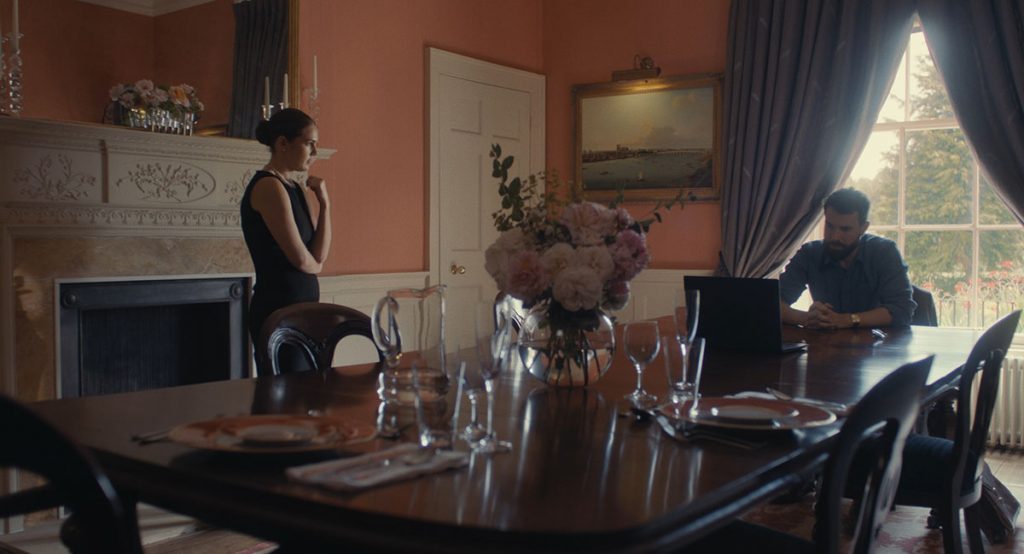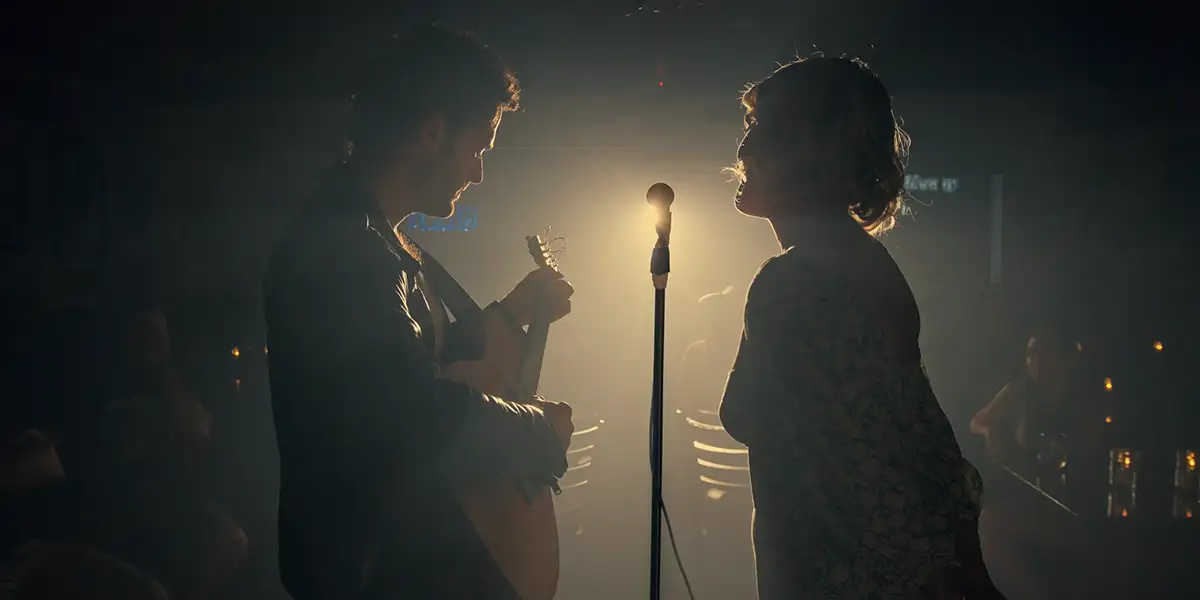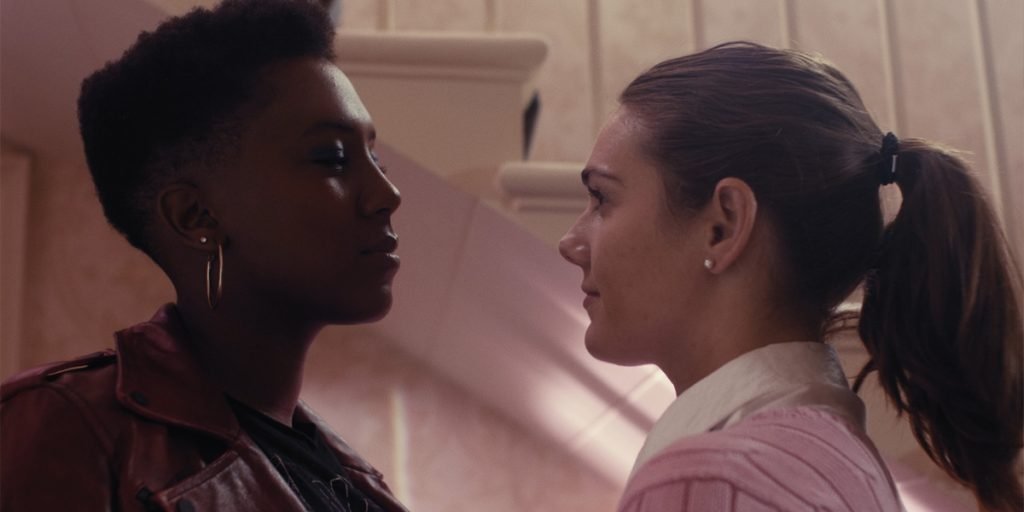Zebra Girl is an aesthetically pleasing British thriller whose female protagonist gives mental health a bad reputation in its representation.
Considering that there is an endless stream of media for artistic expression, it is always an interesting and exciting prospect to see what the crossover between various media will be like. The adaptation of theatre plays into film is certainly one that never fails to deliver interesting new aspects to the original story. Throw in some mental health topics, and I’m immediately interested. After rave reviews for Sarah Roy’s one-woman show “Catherine and Anita,” which premiered during the Edinburgh Fringe of 2017, the time has now come for its adaptation, aptly named Zebra Girl, to make its appearance on the big screen.
In Zebra Girl, Catherine (Sarah Roy, “Catherine and Anita”, Glue) and Dan (Tom Cullen, Knightfall, Downton Abbey) live a comfortable life in a massive mansion somewhere in the plains of England. Having met online, the English professor falls head over heels for his mysterious date, who confesses a bit too much about her past for a first date, and they live happily pruning the garden for a few years. When Catherine discovers the secret her husband has been hiding, she murders him in a fit of spontaneity, or was it? The morning after, her former best friend Anita (Jade Anouka, Cleaning Up, His Dark Materials) shows up and she needs all the help she can get to get rid of the body. Through their talks, we learn more about their intertwined and tortured past, and the events that led Catherine to do the unthinkable. To fight for the future, she must confront her past.
The debut feature film of director Stephanie Zari (Marigolds, Being Keegan), Zebra Girl slightly expands the original sixty-minute show into one hour and eighteen minutes of screen-time. With Derek Ahonen (The Transcendents, Pied Pipers of the Lower East Side) and Sarah Roy returning to the writing table to provide the screen story and the screen play, it is without a doubt “Catherine and Anita” 2.0. Which, in some ways, is also a shame. What works in a theatre play (think of the power of imagination, and the ability to convey thoughts and emotions, and not actions per se,) does not necessarily work the same way on screen. Luckily for Zebra Girl, the theatricality of the narrative plot, as well as the visual allusions to the theatre play that can be seen in its symbolism, prevent the film from becoming too monotonous.

Vice versa, the film has the added benefit of visualizing the extent of Catherine’s mental state. The ever-present spider, for example, signifies Catherine’s increased psychotic tendencies and forms a nice hook to add in the plotline of her past abusive experiences. The pigtails, which are visible in flashbacks of Catherine at age 10 and 15, clearly allude to the various hairstyles Roy adopted to bring her character to life in different ages and stages in her life. Overall, the styling of both Catherine and Anita give such clear signs as to their personalities that it is immediately obvious how they relate to one another. A downside to their distinct personas is that the film heavily toys with the idea of whether or not Anita is a real person, which confuses the viewer as to what is happening, and takes a bit of the thrill away.
Blurring the lines between various forms of mental illness, Zebra Girl attempts to show how nuanced life is with a mental illness. Apart from a specific medication Catherine takes, which provides a clue as to what is actually ‘wrong with her’ (her words, not mine), the film leaves it up to the viewer to discern what is real and what is not, and how much of it is Catherine. Though Zebra Girl’s entire premise revolves around Catherine’ mental illness and the consequences of it, it shies away completely from discussing the topic head on, and instead provides a clichéd and stereotyped version of ‘mentally ill person goes off meds and kills people.’ That is even discounting the fact that Catherine’s mental health state has to be brought on by an abusive past. This might work well for the theatrics, but, in this day and age, people know that there is simply no explanation for the occurrence of mental illness, and thus there is no need to add in a reason why this is all happening. Besides, it is perhaps not the image Zebra Girl set out to put forth.
The dramatic oversimplification of mental illness in the film, extends a thin branch to the very topical debate on medication for mental health and a wish for children, especially in women. As a narrative plot, it works well to keep the story coherent and moving forward, aided by childhood flashbacks and Catherine’s recollections with Anita after the deed is done. The film has a pleasing cinematography, by Catherine Derry (Boy A, Eastern Promises), which focuses on blue tones that match nicely with the pink and purple during key moments in the story and as seen in Catherine’s clothing. The scoring, by Caspar Leopard (The Blood Bride, Son of the Morning), gives Zebra Girl an eery and classic tinge. The overall setting of the film in a grand British mansion and with all the social decorum of the upper middle class gives Zebra Girl a psychopathic tinge reminiscent of American Psycho, but then quintessential British.
Despite its flaws, Zebra Girl is a well put together adaptation of a thrilling one-woman show which no doubt can be an interesting watch for its aesthetics.
Zebra Girl will be released in cinemas in the UK from Friday 28th May, 2021. Watch an exclusive clip from new movie Eating Me Up!

 loudandclearreviews.com
loudandclearreviews.com
